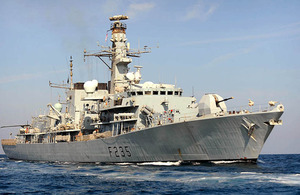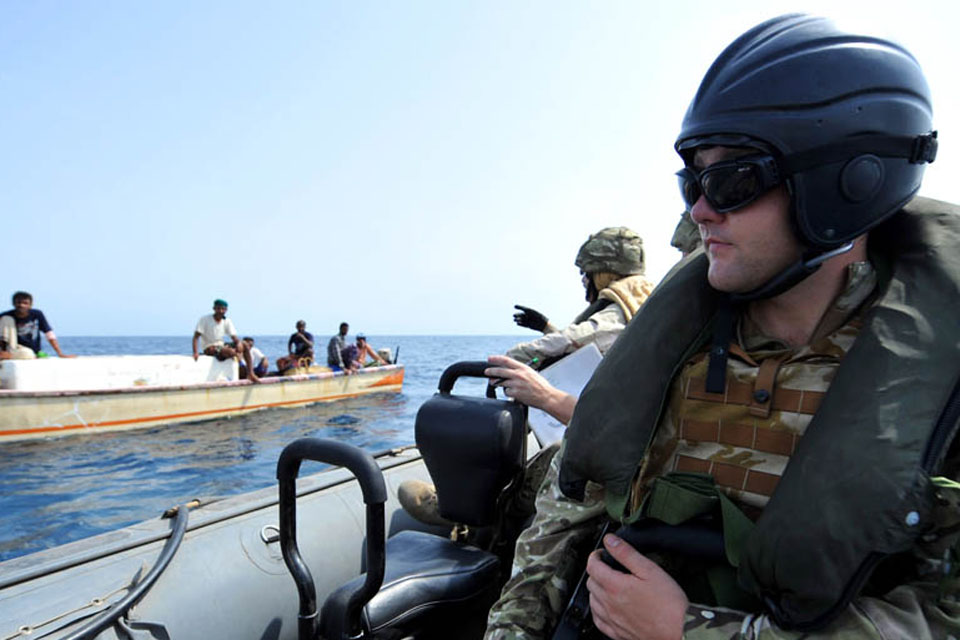HMS Monmouth tackles piracy in the Middle East
Although she's entering the latter stages of her deployment, HMS Monmouth is still hard at work engaging in counter-piracy, counter-smuggling and counter-terrorism operations in the Middle East.

Royal Navy Type 23 frigate HMS Monmouth in the Gulf (stock image) [Picture: LA(Phot) Stuart Hill, Crown Copyright/MOD 2009]
Having left the UK on 26 March 2011, HMS Monmouth, or ‘The Black Duke’ as she is known, has been on patrol across a vast area covering the Red Sea, Arabian Sea, Indian Ocean and the Gulf.
The ship has been working with many other nations to counter terrorism, prevent smuggling and to disrupt and deter piracy. Monmouth has also been involved in multinational maritime exercises, working and training with regional navies, and providing important support to UK strategic interests in the region.
Since Monmouth exited the Suez Canal in April to relieve HMS Cornwall, she has been extremely busy ‘on task’, taking part in counter-piracy, counter-smuggling and counter-terrorism operations.
This has seen Monmouth achieving notable success from the moment she arrived in theatre and gaining recognition for her contribution to operations.
Since she entered the Red Sea, Monmouth has been monitoring maritime movements. This has enabled the ship’s company to more easily identify suspicious activity and to target her investigations at specific vessels amongst the numerous legitimate merchant vessels and fishing boats that she encounters.
Monmouth has undertaken numerous ‘Alongside Assurance Visits’ where she has approached fishing boats and dhows (small local trading vessels) to talk to them and gather information.
This not only helps to understand how people go about their business in the area but also provides them with reassurance that naval assets are helping to maintain their security and safety.

A sailor keeps watch as the Boarding Officer gathers vital information from local fishermen [Picture: LA(Phot) Stuart Hill, Crown Copyright/MOD 2011]
Should Monmouth have reason to be suspicious about the nature of a vessel encountered, she conducts a boarding. This involves sending in the ship’s Royal Marines and Royal Navy boarding teams to confirm that the vessel’s business is lawful and to take details of the crew and any cargo.
This is one of the methods that is used to deter and disrupt piracy, smuggling and terrorist activity.
There have also been more direct interactions with pirated vessels. A notable example occurred when, having received intelligence from another warship, Monmouth tracked and intercepted a pirate mothership in the Gulf of Aden.
After exhausting the full range of warnings the pirates surrendered and the Royal Marines and Royal Navy boarding teams were able to board the vessel, successfully detaining several suspected pirates and releasing 17 hostages.
This was a particular success as a very capable mothership was stopped from being used by pirates and prevented from carrying out further attacks.
Monmouth has also assisted mariners in distress, responding to requests for assistance from vessels for reasons as diverse as to provide urgent medical assistance for a sick sailor to a merchant vessel under attack from armed men.
In the latter case, Monmouth made a high speed approach from over 90 miles (145km) away to assist a 60,000-tonne bulk carrier that had been boarded by six armed men, and the 24 crew had barricaded themselves in the ship’s citadel (a secure room onboard).
Monmouth arrived ready to tackle any number of scenarios and with very little time to act before it got dark.
The ship’s Royal Marines and Royal Navy boarding teams were sent across by boat and helicopter, tasked to ensure that the merchant vessel was clear of intruders, who fled as the teams approached, and then released the ship’s crew from their refuge, allowing the vessel to proceed safely on her way.
HMS Monmouth’s Commanding Officer, Commander Dean Bassett, said:
Since departing the UK in March, HMS Monmouth has been deployed east of Suez helping to maintain security and stability in the region. Our tasking has seen us operating across the Gulf of Aden, Arabian Sea and Somali Basin, working to disrupt and deter piracy, prevent smuggling and counter terrorism.
This has been a very active and successful deployment for HMS Monmouth in which every single person onboard has played an important part.
My ship’s company continue to give their best to ensure that Monmouth is ready for the many challenges we face on operations, and I am immensely proud of their commitment and professionalism; they are a credit to The Black Duke and the Royal Navy.
Monmouth has also participated in some important training serials over the past few months, including a multinational exercise off the coast of Oman alongside other Royal Navy vessels and ships from the Royal Navy of Oman and the US Coast Guard.
She has also seen a number of periods of continuation training with UK teams sent out to help sharpen her war-fighting and damage control skills, and numerous impromptu training serials with UK and coalition vessels and aircraft when the opportunity arose.
These occasions not only ensured that Monmouth was kept at peak capability, but also helped build on the UK’s relationship with the other nations operating in the region, enhancing interoperability and supporting greater co-operation in the future.
In the break between operational patrols, Monmouth has visited a number of ports in the region, allowing the resupply of essential stores, provisions and the movement of personnel. The ship’s company were also very grateful for the downtime, taking advantage of the scorching weather to relax and recharge before returning to sea.
Port visits also allow some important interaction with host nations. In the Seychelles, the ship’s company worked with the local people and authorities, helping out with conservation projects and representing the UK at their National Day parade, as well as providing engineering assistance to their Coast Guard.
In Oman, Monmouth demonstrated her boarding methodology and took part in exchange visits with Omani and US vessels. The ship also visited Dubai for an operational stand-down and self-maintenance period, where she undertook essential planned maintenance and husbandry.